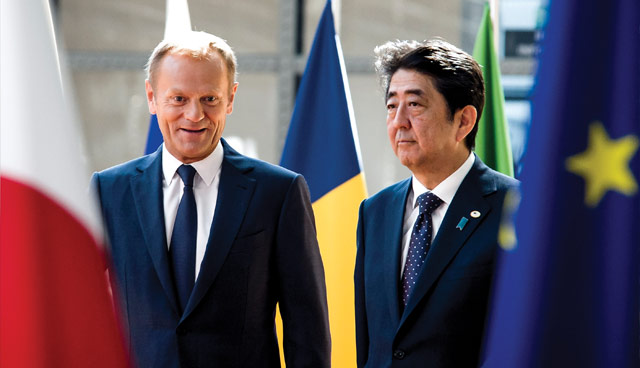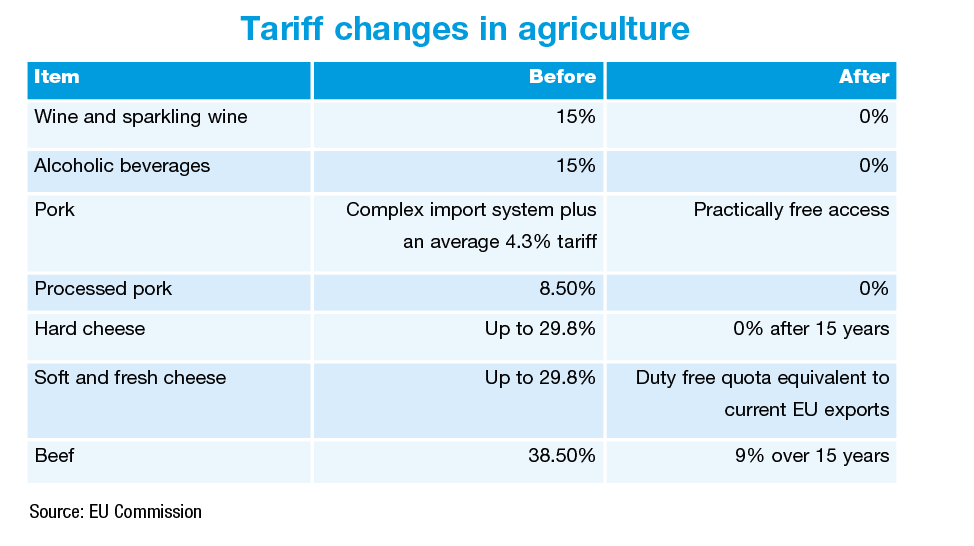EU-Japan agreement

The Economic Partnership Agreement between the EU and Japan, which came into effect on 1 February, will have benefits for Irish food exporters, SMEs and eventually car buyers.
Amidst increased adoption of economic protectionism internationally, the deal struck by the EU and Japan represents the biggest bilateral trade agreement ever negotiated, presenting a welcome win for the EU.
Upon the deal coming in to force, the European Commissioner for Trade, Cecilia Malmstrom, declared as “fiction” the idea that the world is closing and pointed to the deal as an example of a trend that was “still overwhelmingly towards more connection and cooperation”.
In its simplest format, the deal will remove the majority (97 per cent) of tariffs that Japan enforces upon EU goods, and those applied by the EU (99 per cent). It will also liberalise access for the Japanese car-manufacturing industry to EU markets, although on a phased basis.
Currently, Japan is Ireland’s fourth largest trading partner outside of the EU and more than 500 Irish companies export to Japan, the majority of which are SMEs. It’s estimated that the trade channel between Japan and Ireland supports around 7,500 jobs and this could grow, especially given provision within the deal for greater SME market access, such as Small Business Contact Points.
Other notable provisions within the deal include the promotion of green tech, legal standards to protect workers’ rights, the opening up of Japan’s services markets and allowing EU firms to bid on public contracts, most notably on contracts in the railway sector. It also commits Japan to international cars standards, making EU export of cars to Japan easier.
The deal offers protection to over 200 certified European delicacies, including Irish whiskey and Irish cream.
Beyond Ireland, the EU has projected an increase of annual EU exports to Japan of over 13 per cent (€13 billion). Of this, €1 billion will come from processed foods (a 51 per cent rise) and €729 million from exports of dairy products, which equates to a 215 per cent rise.
Other significant predicted annual increases include EU exports of chemicals to Japan (6.9 per cent) and EU exports of textiles (220 per cent).
The EU recognises the significance of the deal in the context of opposition to the deal secured with Canada and over negotiations with the US. Reliant on its reputation to negotiate trade agreements to the benefit of all member states, the deal with Japan will help restore confidence in the EU’s negotiating strength while the shape of Brexit continues to unfold.
Suggesting that such a deal will help equip the EU for major global market changes ahead, the European Commissioner for Trade pointed to a “hard truth” that more than 90 per cent of global growth will soon take place outside the EU.
“Our competitors are building connections and growing stronger,” says Malmstrom. “Both our bilateral trade agreements and the WTO are critical to ensuring that globalisation happens in a fair, rules-based way.”
Stating her belief that the deal will help the EU “stay afloat in the shifting seas of global politics”, she adds that the deal will act to strengthen “Our economy and the economy of our Japanese partners, while building a circle of like-minded friends that will be vital in the years ahead.”






